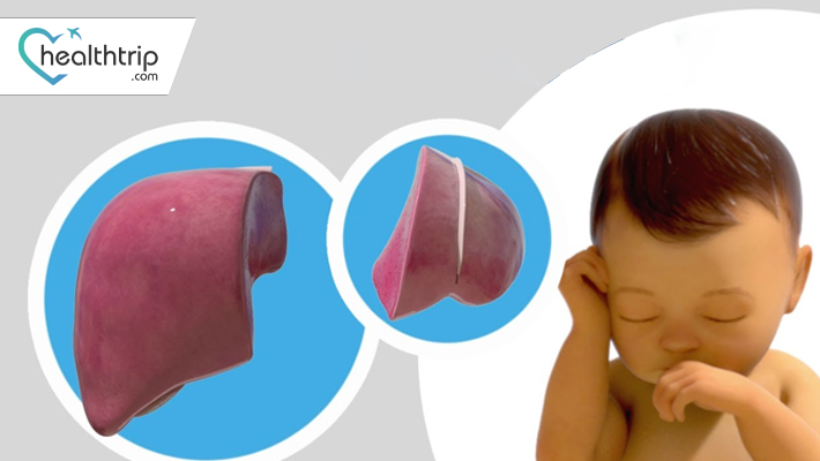
Transplantations hépatiques pédiatriques : considérations particulières et coûts
16 Sep, 2023
 Rajwant Singh
Rajwant SinghIntroduction
Pediatric liver transplantation is a medical marvel that has transformed the lives of countless children facing life-threatening liver diseases. While it offers a lifeline of hope to these young patients, it also presents unique considerations and financial challenges. In this comprehensive exploration, we delve into the world of pediatric liver transplants, uncovering the special factors that come into play and the costs associated with this life-saving procedure.
A. Understanding Paediatric Liver Transplants
a. The Complexity of Pediatric Liver Transplants
Pediatric liver transplantation is a complex surgical procedure that involves replacing a child's diseased or failing liver with a healthy liver from a deceased or living donor.
Transformez votre beauté, Boostez votre confiance
Trouver le bon cosmétique procédure adaptée à vos besoins.

Nous sommes spécialisés dans une large gamme des procédures cosmétiques

1. Indications for Pediatric Liver Transplants
This medical intervention is typically the last resort for children with end-stage liver diseases, acute liver failure, or certain metabolic disorders.
2. Impact on Quality of Life
Pediatric liver transplants have a profound impact on the quality of life and survival of these young patients.
B. Special Considerations in Pediatric Liver Transplants
Pediatric liver transplantation presents several unique considerations and challenges compared to adult liver transplants:
1. Size and Compatibility: A Critical Factor
a. Matching Donor Organs to Recipient Size
Selecting an appropriately sized donor organ is crucial in pediatric transplantation.
b. Limited Pool of Donor Organs
The size of the donor's liver must match the recipient's size and growth potential. This often limits the pool of available donor organs for pediatric patients.
2. Managing Growth Potential
a. Planning for Long-Term Liver Function
Pediatric recipients have significant growth potential
Procédures les plus populaires dans
Arthroplastie totale
Jusqu'à 80% de réduction
Noté à 90 %
Satisfaisant

Arthroplastie totale
Jusqu'à 80% de réduction
Noté à 90 %
Satisfaisant

Chirurgie du cancer
Jusqu'à 80% de réduction
Noté à 90 %
Satisfaisant

Arthroplastie totale
Jusqu'à 80% de réduction
Noté à 90 %
Satisfaisant

Arthroplastie totale
Jusqu'à 80% de réduction
Noté à 90 %
Satisfaisant

b. Accommodating a Growing Child
which necessitates careful planning to ensure that the transplanted liver can accommodate the child's growth over time.
3. Immunosuppression in Pediatric Transplants
a. Balancing Immunosuppression with Immune Development
Children's immune systems are still developing, making immunosuppressive medications a special consideration.
b. Medication Challenges for Children
The medications must balance the need to prevent organ rejection with the child's developing immune system.
4. Psychological Impact of Pediatric Liver Transplants
a. Anxiety and Emotional Challenges
Pediatric liver transplantation can have a profound psychological impact on the child and their family.
b. Supporting Mental Well-being
Children may not fully understand the procedure, leading to anxiety and emotional challenges.
5. The Role of Family Support
a. Parents as Primary Caregivers
Pediatric liver transplant patients often rely heavily on their families for support and care.
b. Advocating for Pediatric Patients
Parents become primary caregivers and advocates for their children throughout the transplant journey.
6. Transition to Adult Care:
a. Adapting to Different Medical Teams
As pediatric transplant recipients grow into adulthood, they face the challenge of transitioning from pediatric to adult transplant care.
b. Navigating Healthcare Systems
This transition involves adapting to different medical teams and healthcare systems.
C. Costs Associated with Paediatric Liver Transplants
a. The Financial Burden of Saving Lives
Pediatric liver transplants come with significant financial implications, encompassing various aspects of the procedure and post-transplant care. Understanding these costs is crucial for families facing this challenging journey:
1. Pre-transplant Evaluation Costs
Extensive medical evaluations, including blood tests, imaging, consultations, and compatibility testing for living donors, are performed to assess the child's suitability for transplantation. These evaluations can incur significant expenses.
2. The Complexities of Transplant Surgery Costs
The actual transplant surgery involves complex procedures, including organ retrieval, recipient surgery, and surgical team fees. Hospital charges for the surgery are one of the major cost components.
3. Lifelong Expenses: Immunosuppressive Medications
Pediatric transplant recipients require lifelong immunosuppressive medications to prevent organ rejection. These medications are costly and must be taken consistently.
4. Ongoing Costs: Post-transplant Care
Regular follow-up visits, diagnostic tests, and hospitalizations may be necessary, especially in the early months following the transplant. These ongoing medical expenses can add up.
5. Rehabilitation and Recovery Costs:
Depending on the child's condition and recovery, rehabilitation services such as physical therapy and occupational therapy may be needed.
6. Travel and Accommodation Expenses:
For families living far from the transplant center, travel and accommodation costs can be substantial. These expenses may continue throughout the child's post-transplant care.
7. The Importance of Psychological Support:
The emotional toll of pediatric liver transplantation on both the child and their family cannot be underestimated. Access to psychological and emotional support services may be necessary.
D. Patient Stories: Triumph over Pediatric Liver Disease
The impact of pediatric liver transplantation on the lives of children and their families is profound. Let's explore the journeys of two young patients who underwent this life-saving procedure.
1. Meredith's Battle with Biliary Atresia
- Meredith was born with biliary atresia, a rare and life-threatening liver disease that affects the bile ducts. Her parents, Ashley Brown and Chris Brown were devastated by the diagnosis but resolved to do everything in their power to give their daughter a chance at life.
- "Meredith's condition was a rollercoaster of emotions for us. We knew she needed a liver transplant to survive, and that was our only focus. The pre-transplant evaluations were extensive and costly, and it was challenging to balance our work and caring for Meredith.
- When we finally received the call that a suitable donor liver was available, we rushed to the hospital. The surgery was a success, and the relief we felt was indescribable. However, the journey was far from over.
- The immunosuppressive medications, frequent follow-up appointments, and the emotional toll on Meradith were immense. We had to make many sacrifices, including financial ones, to ensure she received the best care possible. But seeing her grow and thrive post-transplant made it all worth it. Meredith is our little warrior."
2. John's Autoimmune Liver Disease
- John was diagnosed with Autoimmune liver disease when he was just 6 years old.
- John, a resident of the Philippines, did not live a normal childhood by playing and studying, as he frequently went to hospitals for his Autoimmune Liver Disease.
- John’s plight equally affected the mother, as she had previously lost a child to the same disease.
- The case was jointly evaluated by Prof. (Dr.) Subhash Gupta, Chairman Centre for Liver & Biliary Sciences, and Dr. Vikram Kumar, Principal Consultant, Paediatric Liver Transplantation, recommended Liver Transplantation.
- they managed to reach Max Hospital, Saket and Dr. Subhash Gupta & team ensured that they go back happy with a successful Liver Transplant.
- Irrespective of the difficulties, the surgery was successful and without post-operative complications. John had an early recovery.
Conclusion
Pediatric liver transplantation is a medical marvel that offers children with life-threatening liver diseases a chance at life. While it comes with unique considerations and financial challenges, the impact it has on the lives of young patients and their families is immeasurable.
Families facing pediatric liver transplantation must navigate a complex journey that involves medical, emotional, and financial aspects. Support from healthcare providers, community organisations, and emotional support networks is essential to help them overcome the challenges and provide these young patients with a chance at a brighter future.
Soins de bien-être
Donnez-vous le temps de vous détendre
Prix les plus bas garantis !

Prix les plus bas garantis !




